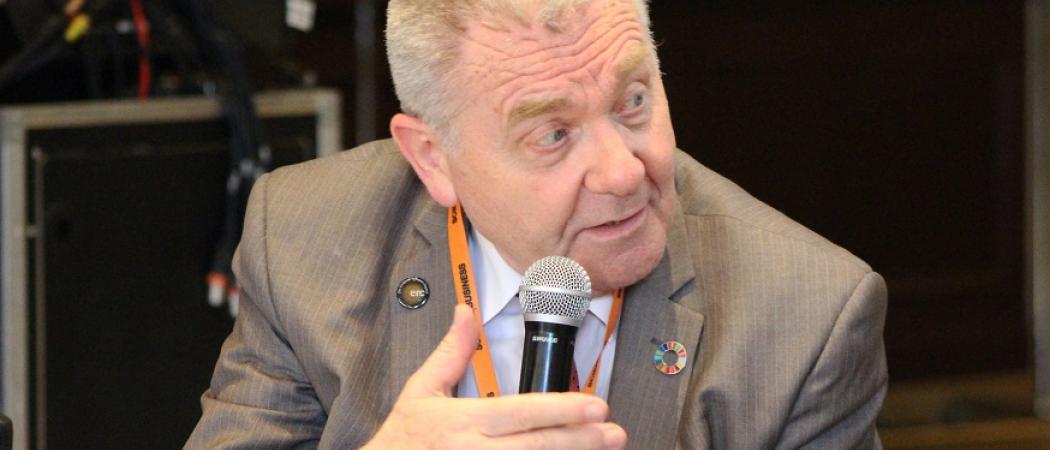Insistence on excellence in its grant selections has made the European Research Council a leading global brand. But there are lots of ways to define what excellence is, a Science|Business conference hears.

ERC president Jean-Pierre Bourguignon. Photo: Lysiane Pons, Science|Business
In just ten years, the European Research Council (ERC) has become a reference point for scientific quality, standing shoulder-to-shoulder with the leading national agencies from the US, Japan, Germany and the UK.
However, its money is not evenly distributed and that has become a political issue, with some member states arguing its excellence criterion is widening the gap between countries that are already well endowed and those trying to build their science up from a low base. In the ongoing political negotiations over the next EU budget, some politicians have been calling for a more even geographical distribution of funds.
But as Jean-Pierre Bourguignon, president of ERC said, the first thought in attempts to bridge the science gap, should not be about money. “The key element is people. Excellent people are all over Europe, and they should have access to funding,” he told a Science|Business conference in Brussels this week.
The ERC promotes equity by championing inclusiveness in who does research, putting the stress on finding talented young people with fresh, and often riskier ideas. “They can take the initiative, rather than doing what they are told by the boss,” Bourguignon said.
For institutions that host ERC grantees, attracting them and their money depends on having the institutional structures that allow scientists to get on with their research. Many countries have increased the number of students in higher education without an accompanying increase in the number of teachers. That has forced researchers to do more teaching, leaving less time for the lab, Bourguignon noted.
In short, a mix of money, power and institutional reforms have to come together to promote equity. “It’s a complex issue; you can’t say give everyone a share and that’s it,” Bourguignon said.
What is excellence anyway?
Elena Dominguez Canas, vice president of international relations at the Spanish National Research Council, said many researchers are not happy with the concept as it is currently applied. “How do you measure it? How do you define it? Is it by the amount of funding, societal impact, [the view] of other scientists? [Excellence] is multi-dimensional,” she said.
Aside from what metrics are considered, excellence is also relative, as Matthias Kleiner, president of the Leibnitz Association, noted. “Is it just excellent in relation to the surrounding people, better than average, or better than your peers?” he said.
For Kleiner, excellence should not be seen as an end in itself. “What do we do with excellence? What is the money going into quantum computing doing in the fight against climate change? How will the money going into artificial intelligence help stop sea levels rising?”
In future, there should be more focus on how to develop excellent outcomes and on supporting more excellent people, Kleiner believes.
The difficulty with that approach is that the relevance of excellent science is not immediately obvious, Dominguez said. “That’s a problem for politicians because they want to see immediate results. We’ve got to be sure we look to the medium and long term.”
Otmar Wiestler, president of the Helmholtz Association, agreed that blue sky research will always be the driving force behind breakthrough innovation, but said, “Are we good enough at picking it up and pushing it along the value chain? That should be a mission for Europe, joining its blue sky research with experts in translation.”
Open to the world
On top of controversy about how the ERC funding is spread around Europe, there is tension over opening the programme up to the rest of the world. Some MEPs have argued for a “Europe First” approach, under which the EU invests research funding only in member states.
But as Karin Dahlman-Wright, vice president of Karolinska Institutet, said, “Given the challenges we are facing, we can’t compete, we have to collaborate.” There may be issues collaborating with countries that do not uphold the EU’s democratic principles or protect academic freedom, but she said, within projects, “We can ensure quality by iterative checking.”
Wiestler agreed. “When you want to address global problems, you need to involve people from the US, Canada, China even,” he said. But EU funded projects should be managed by Europe and be European projects.
To take on problems like climate change, antimicrobial resistance or food insecurity and have a real impact, excellence may have to come second. It is important to cast a wide net for partners. “Look at countries that are not doing so well,” said Dominguez. “There is no way for us to address global challenges if other countries aren’t doing well.”





 A unique international forum for public research organisations and companies to connect their external engagement with strategic interests around their R&D system.
A unique international forum for public research organisations and companies to connect their external engagement with strategic interests around their R&D system.